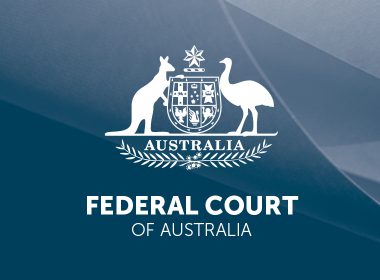Key decisions
- ASIC v Secure Investments Pty Ltd (No. 2) [2020] FCA 1463
- Swannick v Minister for Immigration, Citizenship, Migrant Services and Multicultural Affairs [2020] FCAFC 165
- Hands v Minister for Immigration and Border Protection [2018] FCAFC 22
- Huang v Deputy Commissioner of Taxation [2020] FCAFC 141
CORPORATIONS
Financial services and markets – whether defendants were carrying on a financial services business by issuing financial products – whether loan agreements were financial products
In ASIC v Secure Investments Pty Ltd (No. 2) [2020] FCA 1463 (14 October 2020), the Australian Securities and Investment Commission (‘ASIC’) sought, amongst other relief, declarations that Secure Investments Pty Limited (the ‘Company’) and individuals associated with it carried on a financial services business without authorisation pursuant to an Australian Financial Services Licence (‘AFSL’) in contravention of s 911A of the Corporations Act 2001 (Cth) (‘Corps Act’). The Company was not the holder of an AFSL. One of the issues was whether certain loan agreements entered into between the Company and individuals were, in fact, in the nature of investments in a financial product.
Background
Loan agreements were entered into between the Company and individuals or their superannuation funds over a period from 1 November 2014 to July 2019 (‘Loan Agreements’). The Loan Agreements were in substantially the same terms. The amount of the loan, its repayment date and the applicable rate of interest were identified in a schedule to the agreements. The agreements otherwise contained standard terms and conditions which are ordinarily found in loan agreements.
The proceeds of the ‘loan funds’ were used to invest in property development for which the ‘lenders’ would receive varying rates of return in the form of ‘interest’.
Under s 765A of the Corps Act, a ‘credit facility within the meaning of the regulations’ is not a ‘financial product’ for the purposes of Chapter 7. The expression ‘credit’ for the purposes of r 7.1.06 means a contract, arrangement or understanding under which one person incurs a deferred debt to another person and includes a financial benefit arising from or as a result of a loan (r 7.1.06(3)).
[In dissent, Stewart J] applied the principle first outlined in Hands v Minister for Immigration and Border Protection … to the effect that the exercise of character grounds visa cancellations under s 501 carries with it an obligation of ‘real consideration’ of the circumstances of the people affected, and that that obligation will not be satisfied by decisional checklists or formulaic expression.
ASIC contended that the Loan Agreements were not a ‘credit facility’ as used in s 765A because the definition in r 7.1.06 excludes credit facilities if they are ‘financial products’ (see ss 763A and 763B of the Corps Act). The arrangements between the investors and the Company would be a facility through which a financial investment was made, and therefore ‘financial products’, if, in accordance with s 763B:
- the investors gave money or money’s worth (the contribution) to the Company (s 763B(a)); and
- the investors intended the Company would use the contribution to generate a financial return, or other benefit, for them (even if no return or benefit was in fact generated) (s 763B(a)(ii)); and
- the investors had no day-to-day control over the use of the contribution to generate the return or benefit (s 763B(b)).
Did the Company contravene s 911A of the Corps Act?
Justice Derrington found that the facts supported the conclusion that the first and third elements identified above were satisfied. As to the second element, his Honour said that:
- a mere loan agreement by which money is lent in return for its repayment together with interest is unlikely to satisfy the requirement that it was intended the contribution would be used by a borrower to generate a financial return for the lender;
- the question of what was the intended use of the funds is to be answered in the context of all of the relevant circumstances, including what the investors were told about the transaction;
- the following circumstances supported a conclusion that the arrangement between the parties was that the Company would use the investors’ funds to generate profits for them:
-
- public statements which the Company made on its website and in brochures to the effect that it provided clients with investment options and profitable returns in respect of property development;
- the rate of interest payable was identified as being between a range such as 7% to 10% or 10% to 12%. In the context of the terms of the Loan Agreements this lacked any rationality in a legal logical sense. However, if it was the expectation of the parties that the investor had directly invested in a project, the expressed range of percentages can be discerned as being the scope of the expected profit; and
- from time to time the Company sent correspondence to investors indicating that higher rates of return might be achieved in certain circumstances. This correspondence is consistent with the arrangement being in truth a managed investment rather than that of only lender and borrower.
The Court concluded that the Company was carrying on a financial services business by issuing financial products to investors. As the Company was not authorised pursuant to an AFSL to carry on that business, the Court found that it had contravened the prohibition in s 911A of the Corps Act.
ADMINISTRATIVE LAW
Migration – cancellation of visa under s 501(3A) of the Migration Act (Cth) on character grounds – judicial review – requirement for decision-maker to engage in an ‘honest confrontation’ with the consequences of removal
Swannick v Minister for Immigration, Citizenship, Migrant Services and Multicultural Affairs [2020] FCAFC 165 (1 October 2020).
The appellant (a 50-year-old man) was born in England but had lived in Western Australia since the age of three and never left. It was not disputed that everything of importance to him was also in Western Australia and that he knew no-one in England.
Following a conviction for several counts of unlawful and indecent assault and one count of sexually based offending against a child under the age of 16, the appellant’s permanent residence visa was cancelled by a delegate of the Minister under s 501(3A) of the Migration Act 1958 (Cth) on the basis that he did not satisfy the relevant character test.
Upon the appellant’s release from prison on parole, the relevant parole board considered that his release ‘would not present an unacceptable risk to the safety of the community’. He was transferred that same day into immigration detention awaiting deportation to the UK.
The Minister declined the appellant’s request to revoke the visa cancellation and the appellant’s application for judicial review to the Federal Court was also dismissed.
By a majority of 2:1, the Full Court dismissed the appellant’s appeal.
The substance of the appellant’s complaint was that the Minister did not give adequate consideration to the mental health difficulties he would face if removed from Australia (the appellant had a history of depression, anxiety and self-harm).
McKerracher and White JJ dismissed the appeal on the basis that, as no other jurisdictional error had been established, the appellant’s central argument could only be accepted if the Full Court was to substitute its own conclusion on the merits (at [2] and [27]).
Whilst struck by the evident harshness of the Minister’s decision not to revoke the cancellation of the appellant’s visa (at [27]), White J considered that the question of whether residual discretion should be exercised in the appellant’s favour was a matter for the Minister (at [38]).
Stewart J dissented and would have allowed the appeal. In so holding, his Honour applied the principle first outlined in Hands v Minister for Immigration and Border Protection [2018] FCAFC 225; 267 FCR 628 at [3] to the effect that the exercise of character grounds visa cancellations under s 501 carries with it an obligation of ‘real consideration’ of the circumstances of the people affected, and that that obligation will not be satisfied by decisional checklists or formulaic expression.
Stewart J considered that the Minister’s reasons glibly and compendiously described the appellant’s claims and fears as ‘significant hardship’ and failed to confront what was really being done to the appellant (at [89]). His Honour would have set aside the Minister’s decision and issued a mandamus for the Minister to consider the matter again according to law. Whilst a lawful decision might still have the same outcome, the reality of the outcome on the visa holder must be confronted for the decision to be lawful (at [93]).
PRACTICE AND PROCEDURE
Freezing order extending to assets overseas — whether enforcement of Australian judgment in foreign jurisdiction needs to be a ‘realistic possibility’ or ‘not impossible’
Huang v Deputy Commissioner of Taxation [2020] FCAFC 141 (17 August 2020) concerned an appeal from Mr Huang against a decision in which the primary judge made freezing and asset disclosure orders which extended to assets outside of Australia in the People’s Republic of China (‘PRC’) and Hong Kong.
Background
Mr and Mrs Huang lived in Australia for several years. On 4 December 2018, Mr Huang left Australia for the PRC and his wife left 9 months later. Following an audit of his tax affairs, the Deputy Commissioner issued to Mr Huang notices of Amended Assessment for several financial years and a notice of assessment of shortfall penalty assessing Mr Huang as liable for a total amount of approximately $140 million.
Having commenced proceedings for the recovery of the debt, the Deputy Commissioner subsequently applied for and was granted summary judgment against Mr Huang for the full amount as well as freezing orders and asset disclosure orders against both Mr Huang and his wife in relation to assets both in and outside of Australia.
In the appeal before the Full Court, Mr Huang challenged the freezing and asset disclosure orders insofar as they concerned his overseas assets. The primary judge had extended the freezing and asset disclosure orders to the overseas jurisdictions on the basis that enforcement of the Australian judgment overseas was ‘not impossible’.
The Appeal
The Court (Besanko, Thawley and Stewart JJ) noted that the purpose of a freezing order as identified in r 7.32 of the Federal Court Rules 2011 is the prevention of the frustration or inhibition of the Court’s process by seeking to meet a danger that a judgment or prospective judgment of the Court will be wholly or partly unsatisfied.
The Court determined that the appropriate test is whether there is a ‘realistic possibility that any judgment obtained by the plaintiff can be enforced against assets of the defendant in the place to which the proposed order relates.’ The Court said that such a test is consistent with the approach taken by the courts in determining what must be shown in terms of the risk of the removal of assets or the disposal of assets, matters to which a freezing order is directed. The test of ‘not impossible’ used by the primary judge set the bar too low.
The Court held that there was no ‘realistic possibility’ that the Deputy Commissioner’s judgment debt would be enforceable in the PRC or Hong Kong.
Accordingly, leave to appeal was granted and the appeal allowed with the effect that the freezing and asset disclosure orders were confined to the assets held in Australia.

Anthony Lo Surdo SC is a barrister, arbitrator and mediator in 12 Wentworth Selborne Chambers, Sydney; Lonsdale Chambers, Melbourne; and Outer Temple Chambers, London, Abu Dhabi and Dubai.
Theresa Power is a barrister in 12 Wentworth Selborne Chambers, Sydney.



